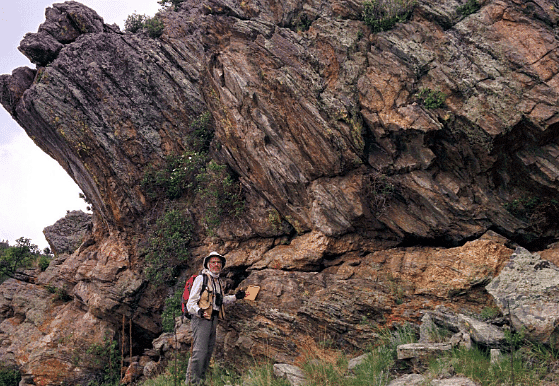ACT Exam > ACT Notes > Science for ACT > Bedrock
Bedrock | Science for ACT PDF Download
Introduction
- Bedrock, the firm, solid rock located beneath surface layers such as soil and gravel, also underlies sediments on the ocean floor. It represents consolidated rock, densely bound and unyielding, in contrast to the loose particles of overlying unconsolidated rock. Extending deep into the Earth's crust for hundreds of meters, bedrock is demarcated by its upper boundary, known as the rockhead.
- Above this layer, one may encounter saprolite, a variant of bedrock altered through intense chemical weathering, resulting in a distinct composition. Exposed bedrock, visible in mountaintops, rocky coastlines, and plateaus, serves as outcrops or outcroppings, accessible through natural processes or deliberate drilling efforts.

Significance of Bedrock
- Identifying bedrock assumes significance in fields like geology, stratigraphy, and civil engineering. Geologists and stratigraphers rely on understanding rock layers and their evolution over time, aided by insights into bedrock depth and type. For instance, regions like southern Indiana, with exposed bedrock, provide clues about past geological events like glacial activity during the Ice Age.
- Bedrock also aids in identifying rock formations and creating geologic maps, essential for understanding geological processes and locating valuable resources like aquifers and petroleum deposits. In civil engineering, accurate assessments of bedrock are crucial for constructing stable structures, ensuring safe foundations, and securing critical infrastructure like bridges. For example, the Brooklyn Bridge's stability hinges on its anchoring to bedrock, underscoring the importance of this geological foundation in engineering endeavors.
The document Bedrock | Science for ACT is a part of the ACT Course Science for ACT.
All you need of ACT at this link: ACT
|
486 videos|517 docs|337 tests
|
FAQs on Bedrock - Science for ACT
| 1. What is the significance of bedrock in geology? |  |
Ans. Bedrock is the solid rock underlying the loose surface materials such as soil and gravel. It provides stability and support for the overlying layers and plays a crucial role in determining the landscape's topography.
| 2. How is bedrock important for construction projects? |  |
Ans. Bedrock serves as a strong foundation for buildings and structures, ensuring stability and preventing shifting or settling. Engineers rely on bedrock to provide a solid base for construction projects.
| 3. Can bedrock affect the formation of rivers and valleys? |  |
Ans. Yes, bedrock influences the formation of rivers and valleys by determining the flow of water and shaping the landscape. Erosion of softer rock layers overlying bedrock can create valleys and river channels.
| 4. How does the composition of bedrock impact agriculture? |  |
Ans. The composition of bedrock influences soil fertility and nutrient availability, which can affect agricultural productivity. Certain types of bedrock may contain minerals that are beneficial or harmful to plant growth.
| 5. Is bedrock important for groundwater storage and aquifer formation? |  |
Ans. Yes, bedrock plays a crucial role in storing groundwater and forming aquifers. Porous and permeable bedrock layers allow water to seep through and accumulate underground, providing a vital source of water for wells and springs.

|
Explore Courses for ACT exam
|

|
Signup for Free!
Signup to see your scores go up within 7 days! Learn & Practice with 1000+ FREE Notes, Videos & Tests.
Related Searches
















